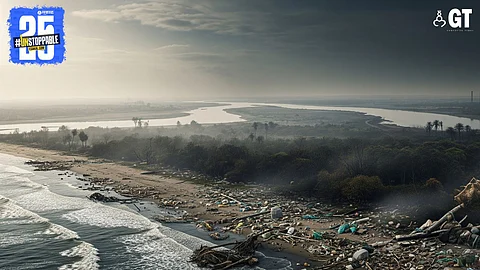

Goa is changing, and not for the better. On the surface, things may seem fine. The statistical charts are pointing northwards and government departments are patting themselves on the back for progress in education, tourism, social welfare, and other sectors.
However, the reality on the ground is different. There’s a growing sense that something intrinsic, something irreplaceable, is quietly slipping away. That something is Goa, itself.
We're going about our daily lives with a misplaced sense of belief, as if everything is hunky-dory. But, in the real sense, we are living a number’s life, one shaped by polished data and inflated projections, not by lived experiences.
Glossy reports and tourism figures may please officials, but for many Goans, the soul of the State is fading. There is a widening gap between what’s being projected and what people are actually experiencing.
We're going about our daily lives with a misplaced sense of belief, as if everything is hunky-dory.
Migration, for example, is a global reality, one cannot deny that. But in Goa’s case, it has reached a tipping point. From housing and land ownership to small businesses and cultural spaces, the Goan way of life is being edged out.
This is not about exclusion. It is about balance and that balance is under severe threat. Goa’s charm, its identity, rooted in Goemkarponn — our language, our traditions, our ethos — is dissolving into a mishmash that no longer resembles the land our ancestors nurtured.
Goans are talking, yes. Social media is buzzing. Whispers of concern echo in living rooms and village squares. But talk alone won’t do. We’re not demanding accountability from our leaders, and therein lies the real danger.
Our rivers are polluted, our hills are being razed, and our coastline is under siege from commercialisation. Yet, instead of confronting the harsh truth, we hide behind a veil of denial.
Goans are talking, yes. Social media is buzzing. Whispers of concern echo in living rooms and village squares. But talk alone won’t do.
We need to ask some hard questions: What is the vision of those we’ve elected? Is it a people’s vision or a political one? Are our leaders merely following development blueprints that suit a few, or are they genuinely building a future that respects the aspirations of Goans? The answers are becoming increasingly obvious, and disturbing.
The price of inaction is steep. Every other day, we hear big promises — of smart cities, global tourism hubs, job creation — but every other day, the reality is becoming bleaker.
Young people are particularly at a crossroads. They are the inheritors of this land, but many are distracted by digital lives that pull them away from real-world engagement. It’s time they looked up from their screens, and asked themselves what kind of Goa they want to live in 10 years from now.
More hills or more buildings? More forests or more flyovers? Do we want a Goa that’s remembered for its natural beauty, cultural warmth, and peaceful way of life, or one that is slowly turning into another indistinguishable urban jungle?
Young people are particularly at a crossroads. They are the inheritors of this land, but many are distracted by digital lives that pull them away from real-world engagement.
Let’s not forget why tourists come to Goa. They come here for peace, not for chaos. And yet, we see rising instances of drunken driving, reckless behaviour, and even violent crimes.
We’ve seen a tourist kill a local over a petty argument. We’ve seen beaches turned into open bars and rivers become dumping grounds. Tourism without regulation, without a moral compass, is a recipe for disaster.
Fun must come with responsibility. Tourists must know they are guests, not owners of the land. They cannot bring their stress, their aggression, or their entitlement into a place known for hospitality and harmony. And, it is the responsibility of both the government and the citizens to set boundaries, not just build resorts.
The biggest tragedy is not what others are doing to Goa, but what we are allowing to happen. We’ve stood by as our beaches were plundered, our hills flattened, our heritage diluted. But, it’s not too late.
Fun must come with responsibility. Tourists must know they are guests, not owners of the land.
Goa is not just the coastal belt. There is still life and authenticity left in the hinterlands. There are villages where the old ways still breathe. These need to be protected, not sacrificed on the altar of ill-defined development or unplanned tourism.
Every time politicians use the word "jobs" to justify destructive policies, ask them: where are these jobs, and who is getting them? If Goans aren't being employed in the tourism industry, in government projects, in the development schemes — then what exactly are we developing, and for whom?
We are at a crossroads. We can continue to live in denial, comforting ourselves with the illusion that everything is fine. Or, we can wake up, demand answers, and work toward reclaiming our land, our identity, and our future.
The choice is ours. But, the clock is ticking.